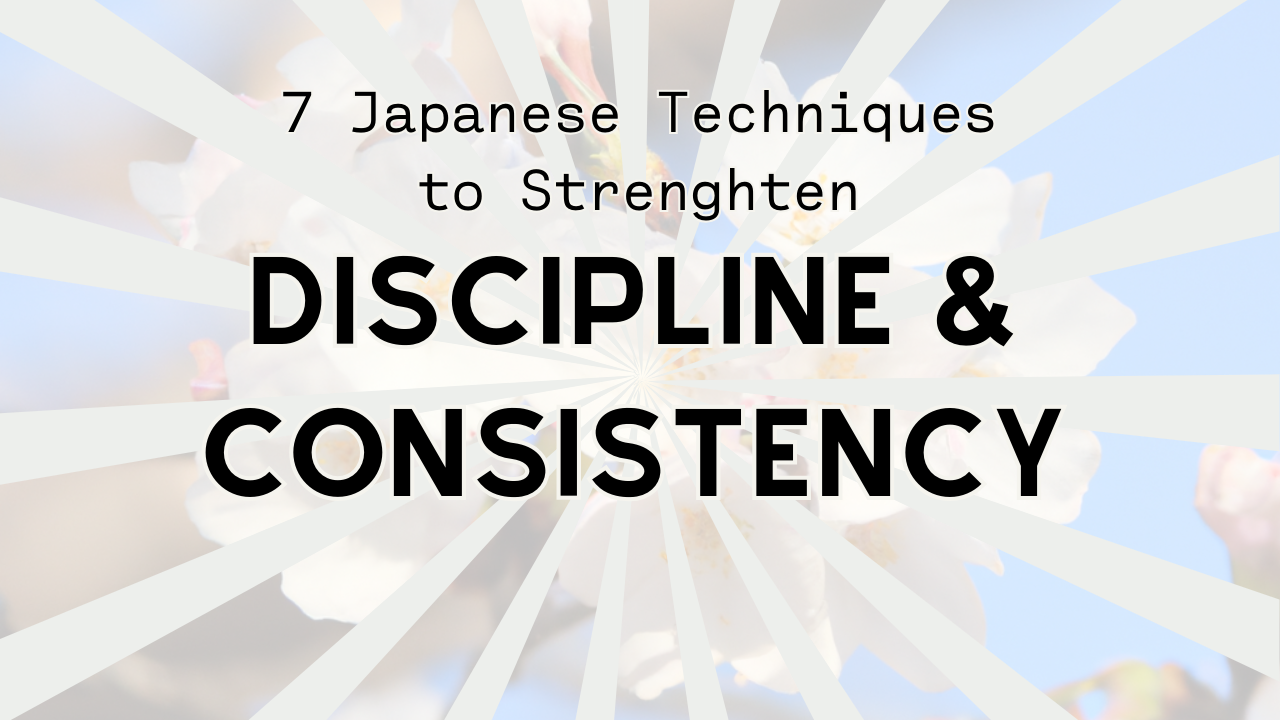7 Japanese Techniques to Strengthen Discipline and Consistency

I strongly believe in the power of leaning into our unique strengths while fine-tuning our challenges, to ideally make them less challenging. Recently having a conversation along these lines with my sister Natalie Micale, who is an Executive Career Coach, she suggested I read Strengths Based Leadership and take the Clifton Strength Assessment.
I purchased the book and used the included code to take the assessment. Let's just say Discipline isn't exactly my top strength. Neither is Consistency. However, Connectedness is. Followed up by Ideation, Futuristic, Strategic, and Empathy
As someone with several of their top strengths in the realm of thinking and strategy, naturally, I researched solutions for combatting my less than stellar Discipline and Consistency. Research which led me to discovering techniques rooted in Japanese wisdom.
Japanese culture is renowned for its discipline, consistency, commitment, and work ethic. Qualities which are not just a result of societal norms, but rather are deeply rooted in various techniques and philosophies that help individuals stay on track and overcome challenges, including... procrastination, or a lack of discipline, consistency, etc.
Here are seven Japanese techniques to help you get your act together and keep in on track:
-
Kaizen (Continuous Improvement)
Rooted in the philosophy that little steps can lead to significant changes, Kaizen emphasizes continuous improvement. Instead of attempting massive tasks at once, Kaizen suggests breaking them down into smaller, manageable steps. By focusing on incremental progress, this approach helps in reducing the intimidation of a task and makes it easier to start and continue.
-
Kanban (Visual Management)
'Kanban' translates to 'visual card'. In this technique, tasks are visualized using cards on a board. The board usually has three columns: 'To Do', 'In Progress', and 'Done'. By visually mapping out tasks, one can see progress, which boosts motivation, and also identify bottlenecks or areas where they might be slacking.
-
Ganbatte (Do Your Best)
This term expresses encouragement and determination. It's the philosophy of giving one's all, irrespective of the circumstances. When you feel like procrastinating, reminding yourself to 'Ganbatte' can serve as a motivational push to give it your best shot, regardless of the outcome.
-
Ikigai (Reason for Being)
Ikigai is a concept that helps one find their purpose in life. When you understand your Ikigai, it provides you with a profound reason to get out of bed every morning. By determining what you love, what the world needs, what you can be paid for, and what you're good at, you can find your Ikigai and fuel your daily actions with passion and purpose.
-
5S Methodology
Originating from five Japanese words - Seiri (Sort), Seiton (Set in order), Seiso (Shine), Seiketsu (Standardize), and Shitsuke (Sustain) - this technique is about organizing your workspace. A clutter-free and systematic environment can reduce distractions and make it easier to focus, thus reducing tendencies to procrastinate.
-
Mottainai (Waste Not, Want Not)
Mottainai is a term expressing regret over waste. This concept can be applied to time as well. Recognizing the value of every moment and seeing procrastination as a waste of one's precious time can inspire one to act promptly and make the most of the present.
-
Shoshin (Beginner’s Mind)
Shoshin refers to approaching tasks with the openness and enthusiasm of a beginner. When we maintain a beginner's mind, we see possibilities, not challenges. This mindset can help combat the feeling of being overwhelmed or thinking that a task is monotonous. By continuously looking at tasks with fresh eyes, one can find motivation and avoid laziness.
I appreciate the timeless wisdom of these age-old Japanese techniques, and have started integrating them into my life to enhance the motivation, purpose, and discipline needed to maintain a sense of consistency.
Embrace these methods for yourself, and see what you think. And if you take the Strength Assessment, feel free to comment your results below. Here's the link again to purchase the book.
View The Entire Collection
See all our blog posts on business, manifestation, and designing a life you love.



